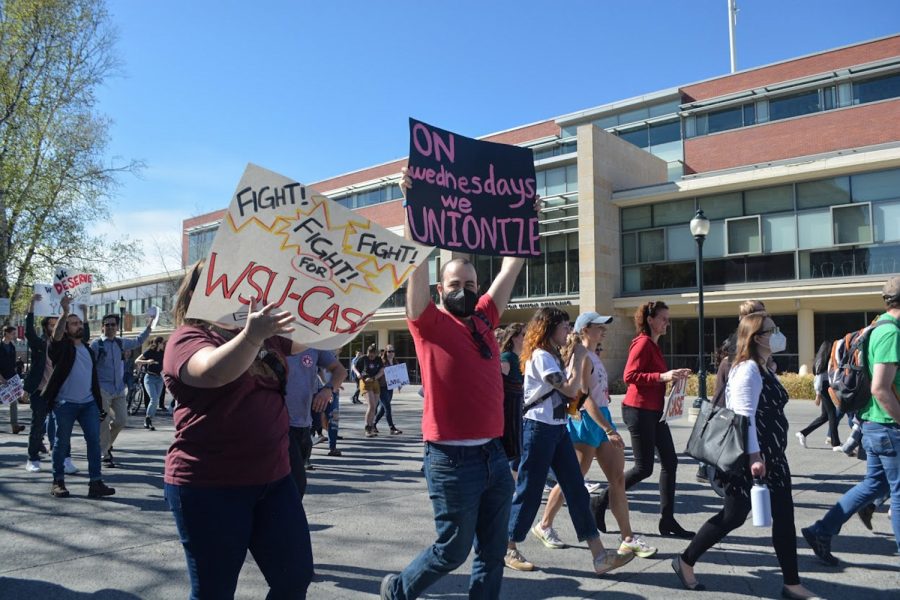WSU stalls unionization for student employees
WSU considers whether research assistants provide service to university, delays hearing date
Academic student employees march toward WSU Pullman’s French Administration Building to present their petition to the administration at a rally, May 4.
August 1, 2022
Nearly three months after academic student employees filed a petition to unionize, WSU is stalling their progress and questioning research assistants’ role in the bargaining unit.
“The longer they delay, the longer that ASEs are not getting by with proper medical care because their health insurance is not good enough, or their stipends are below a living wage,” said Claudia Skinner, doctoral candidate in American studies and culture. “The longer they delay, the harder it is to receive protection from discrimination in the workplace. The clock is ticking, and we can’t wait any longer.”
To certify WSU Coalition of Academic Student Employees’ union, WSU must provide a list of academic student employees that will be verified against authorization cards, which are essentially votes from ASEs in favor of unionizing, Skinner said.
WSU provided the list to the Public Employment Relations Commission this summer, but it did not include ASEs who will work in the fall or are not employed through the Workday system. WSU will update PERC as students are added to Workday, Skinner said.
The list also highlighted research assistants’ (RA’s) names, noting that WSU could not determine whether or not RA’s provide a service to the university and should be a part of the bargaining unit, she said.
“It is a huge slap in the face,” said Jordan Newburg (she/they), doctoral candidate in prevention science. “WSU is an R1 institution, and that work is made possible through current research assistants. How are you gonna say research assistants don’t provide a service, but get to maintain your R1 status, which is what draws in students?”
Research projects bring in grant funding, and build WSU’s reputation as a university with very high research activity as a result of RA’s, whose work allows principal investigators to become established in their field, they said.
Newburg said it is concerning that the WSU administration can easily dismiss her work in the IMPACT lab, analyzing suicide prevention and post-vention in rural areas as well as community wellness programs for mental health and substance abuse.
“It’s very disheartening,” they said. “It’s just a huge message: we only care about the products and we don’t care how we get them.”
By questioning RAs’ service to the university, WSU ensured RAs’ authorization cards cannot be counted until it rescinds its statement or a hearing is scheduled to resolve the issue. WSU has not committed to a hearing date, Skinner said.
David Wasson, WSU director of news and media relations, said WSU continues to fully participate in the process outlined by PERC.
WSU has not yet provided its reasoning for questioning RAs’ service expectancy, Skinner said.
In 2003, University of Washington RA’s were also excluded from their bargaining unit, but PERC ultimately rejected UW’s claim that RA’s do not provide a service, Skinner said. UW created a definition for service expectancy, stating that RA’s provide a service if they have a faculty adviser and complete work that benefits their grant or contract.
Ninh Khuu, doctoral candidate in plant pathology, said graduate students often work over 20 hours per week to fulfill research grants. His research on how viruses affect hops, which are used to flavor beer, directly impacts Washington communities because they are the leading producers of hops in the U.S.
“I don’t understand how they can rationally argue that [RA’s don’t provide a service],” Khuu said. “Most students are doing the actual work on the ground and are actually able to fulfill the grants that cover the overhead that literally keeps the power on in our buildings.”
When WSU-CASE spoke with UW and other collegiate unions this summer, students realized WSU’s delay tactics are part of a pattern from universities in the past. The delay demonstrates a lack of care for student employees, Skinner said.
“We’re not meant to be broken down by this place, and I’ve seen people being broken down by this place,” she said. “When I see WSU administration delay, it tells me that they’re okay with that, and I find that really difficult to process.”
As inflation and university fees increase, ASE’s are facing financial difficulty without the opportunity to bargain for fair wages. Newburg said they have to rely on family support to afford their cost-of-living expenses, which amount to roughly $1,700 each month. RA’s earn about $1,300-1,400 per month.
In June, WSU’s graduate school announced it is increasing students’ health insurance premiums by $481 in 2022-23. WSU-CASE is looking into whether this violates the Dynamic Status Quo period, where WSU cannot make changes to conditions that were not regularly made or approved before ASE’s filed their petition to unionize, according to the WSU-CASE website.
Khuu, who is on WSU’s Student Health Insurance Advisory Board, said SHIAB was not aware of the premium increase before it was sent to the state’s health insurance commissioner for approval.
He said ASE’s often neglect their health care because their out-of-pocket maximum is $7,000.
Students have called him, crying, because they have paid $600 out-of-pocket for simple blood tests, he said. Khuu knows students who paid the maximum amount, and insurance stopped covering their care for physical therapy, blood clots and chronic health issues, he said.
“We just want to be paid fair wages and get decent benefits,” he said. “We’re not asking for fancy things, we’re just asking for the basics – to be treated as human beings.”
Hoping to hasten the union certification process, WSU-CASE created a mobilization work group to hear from students across departments and campuses. As the fall semester approaches, WSU-CASE is eager to “hit the ground running” and plan events and protests, making their message clear to WSU, Skinner said.
She said ASE’s do not want WSU to be the only major public research institution on the West Coast that does not have a student union and hopes WSU will “step out of the past.”
“Be a part of that change. Don’t regret this down the line,” she said.










